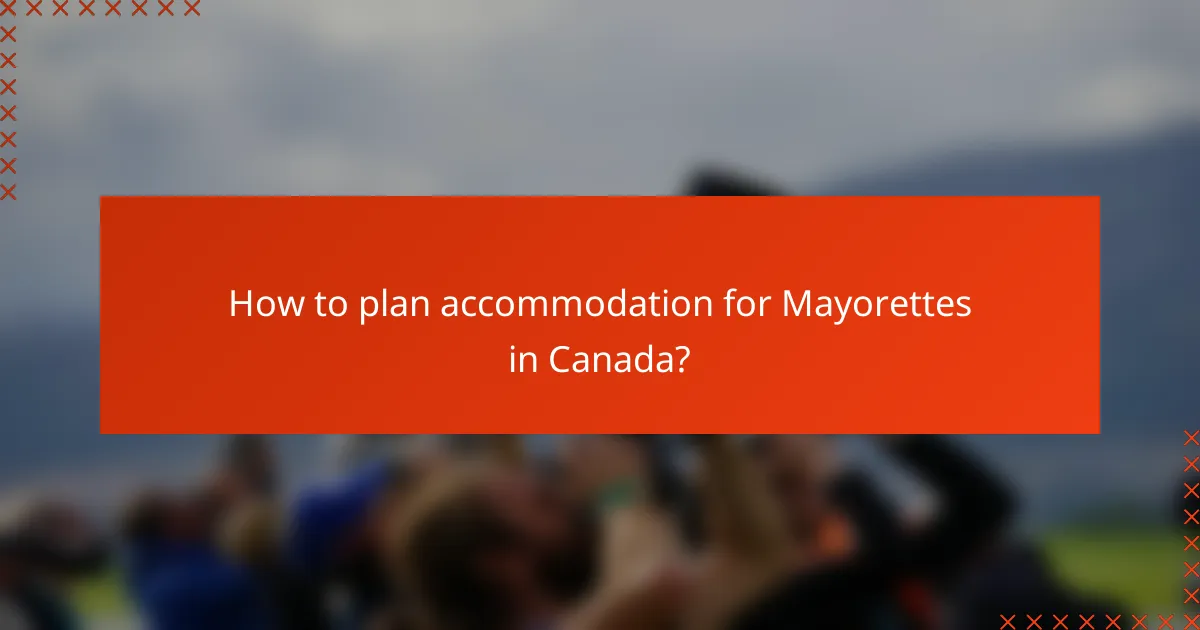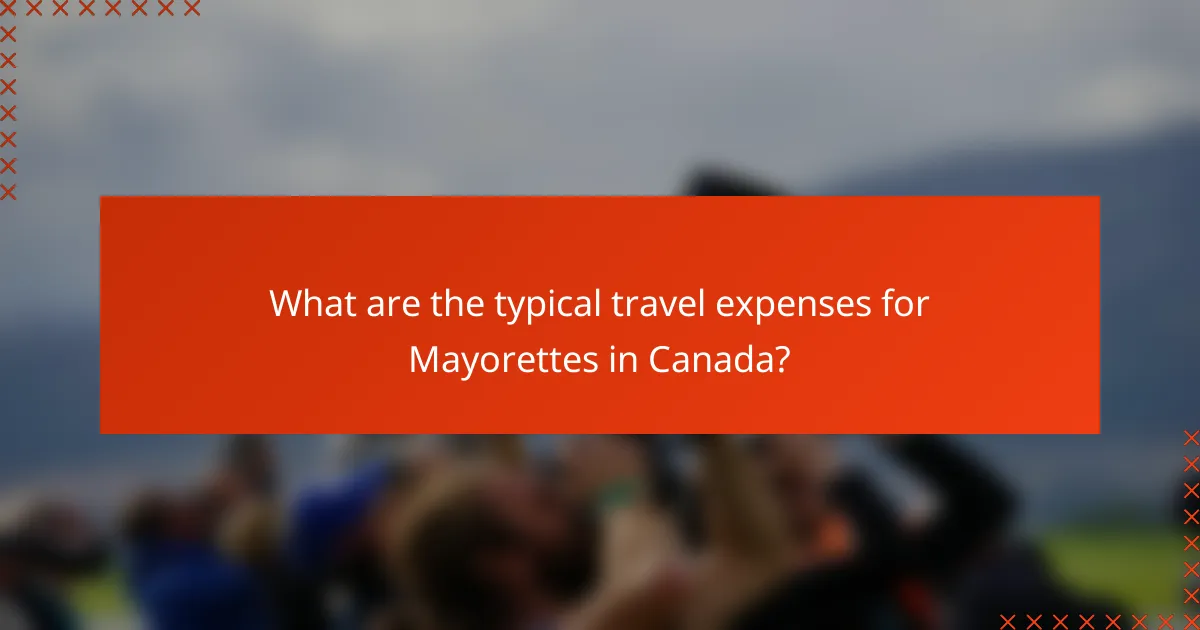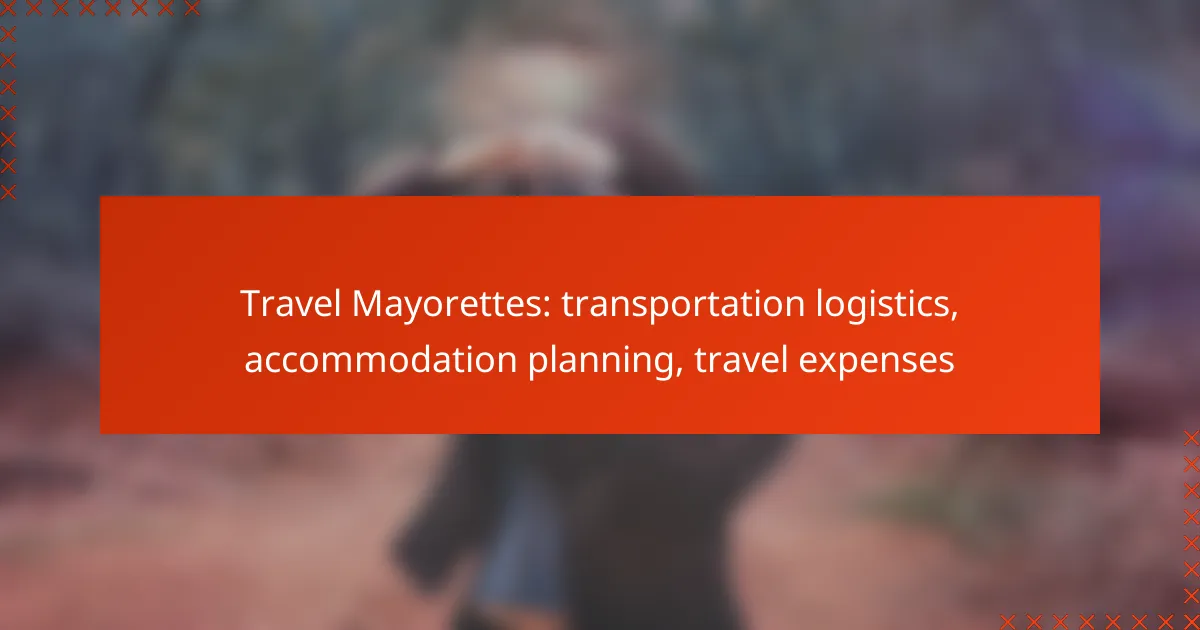Traveling as Mayorettes in Canada requires careful consideration of transportation logistics, accommodation planning, and travel expenses. With various transportation options available, such as public transit and rental cars, groups can choose what best fits their needs. Additionally, selecting the right lodging is crucial for comfort and budget management, while being mindful of all associated costs ensures a successful trip.

What transportation options are available for Mayorettes in Canada?
Mayorettes in Canada have several transportation options to choose from, including public transit, rental cars, ride-sharing services, charter buses, and airport shuttles. Each option offers unique benefits and considerations depending on the group’s size, budget, and travel needs.
Public transit systems
Public transit systems in Canadian cities typically include buses, subways, and light rail. These options are often cost-effective, with fares ranging from a few dollars to around ten dollars per trip. However, schedules can vary, so planning ahead is essential to ensure timely arrivals.
For larger groups, consider purchasing day passes or group tickets, which can provide significant savings. Familiarizing yourself with local transit apps can also enhance navigation and real-time updates.
Rental car services
Rental car services are widely available across Canada, offering flexibility for Mayorettes who prefer to travel at their own pace. Major companies like Enterprise, Hertz, and Avis operate in most cities, with daily rates typically starting around CAD 30 to CAD 100, depending on the vehicle type.
When renting, check for insurance options and fuel policies. Booking in advance can often yield better rates, and consider the size of the vehicle to accommodate your group comfortably.
Ride-sharing platforms like Uber
Ride-sharing platforms like Uber are popular in urban areas, providing convenient door-to-door service. Fares vary based on distance and demand, usually ranging from CAD 10 to CAD 50 for short to medium trips.
Using ride-sharing apps can be especially useful for quick trips or when public transit is less accessible. Ensure that all group members have the app installed for easy coordination and payment sharing.
Charter bus services
Charter bus services are ideal for larger groups, offering a comfortable and economical way to travel together. Companies like Greyhound and local charter services provide options for half-day to multi-day rentals, with costs typically starting around CAD 500 for a day.
When booking, consider the amenities offered, such as Wi-Fi and restrooms, and confirm the bus capacity to ensure everyone can travel together. Early reservations are recommended, especially during peak travel seasons.
Airport shuttle services
Airport shuttle services provide a reliable option for transportation to and from airports. Many hotels offer complimentary shuttles, while private shuttle companies charge fares ranging from CAD 15 to CAD 50 per person, depending on the distance and service level.
Booking in advance can secure better rates and ensure availability, especially during busy travel times. Check with your accommodation to see if they provide shuttle services, as this can simplify logistics for your group.

How to plan accommodation for Mayorettes in Canada?
Planning accommodation for Mayorettes in Canada involves selecting suitable lodging options that cater to group needs and budgets. Consider factors such as location, amenities, and potential discounts to ensure a comfortable stay.
Hotel booking platforms like Booking.com
Using hotel booking platforms like Booking.com can simplify the accommodation search. These sites allow you to filter results based on price, location, and guest ratings, making it easier to find suitable hotels for Mayorettes.
Look for properties that offer group rates or flexible cancellation policies. Booking in advance can often secure better rates, especially during peak travel seasons in Canada.
Vacation rental options through Airbnb
Airbnb provides a range of vacation rental options that can accommodate larger groups, making it ideal for Mayorettes. You can find entire homes or apartments that offer more space and amenities than traditional hotels.
When using Airbnb, check the host’s cancellation policy and read reviews from previous guests. This will help ensure a positive experience and avoid any surprises upon arrival.
Group accommodation discounts
Many hotels and rental services offer group accommodation discounts, which can significantly reduce costs for Mayorettes. Contact properties directly to inquire about special rates for larger bookings.
Consider organizing your group’s stay at a single location to maximize savings and convenience. This can foster a sense of camaraderie and simplify logistics during the trip.
Local hostels and budget stays
For those on a tighter budget, local hostels and budget stays can be excellent options. Hostels often provide shared accommodations and communal spaces, which can enhance the group experience.
Research hostels in the area you plan to visit, and check for amenities such as free Wi-Fi and kitchen facilities. Booking in advance is advisable, especially in popular tourist destinations in Canada.

What are the typical travel expenses for Mayorettes in Canada?
Travel expenses for Mayorettes in Canada typically include accommodation, transportation, food, entertainment, and insurance. Understanding these costs helps in budgeting effectively for trips, ensuring a smooth experience.
Average accommodation costs
Accommodation costs for Mayorettes can vary significantly based on location and type of lodging. In major cities like Toronto or Vancouver, hotel rates may range from CAD 150 to CAD 300 per night, while smaller towns might offer options from CAD 80 to CAD 150.
For longer stays, consider renting an apartment or using platforms like Airbnb, which can provide more affordable rates and amenities. Always book in advance to secure the best deals.
Transportation budget estimates
Transportation expenses for Mayorettes include flights, local transit, and car rentals. Domestic flights within Canada can range from CAD 100 to CAD 400, depending on distance and time of booking.
For local travel, public transit is often the most economical choice, with fares typically around CAD 3 to CAD 4 per ride. Alternatively, renting a car may cost between CAD 50 to CAD 100 per day, plus fuel.
Food and entertainment expenses
Food costs can vary widely based on dining preferences. Budget around CAD 15 to CAD 30 per meal at casual restaurants, while fine dining can exceed CAD 50 per person. For Mayorettes, planning for three meals a day is essential.
Entertainment expenses, such as attractions and events, can add up. Set aside CAD 20 to CAD 100 per day for activities, depending on the itinerary and interests.
Insurance and emergency funds
Travel insurance is crucial for Mayorettes, covering unexpected medical expenses or trip cancellations. Policies typically range from CAD 50 to CAD 150 for a week-long trip, depending on coverage levels.
Additionally, it’s wise to have an emergency fund of at least CAD 200 to CAD 500 available during travel for unforeseen expenses. This ensures peace of mind and readiness for any situation that may arise.

What criteria should be considered for travel logistics?
When planning travel logistics, key criteria include group size, travel duration, and seasonal factors. These elements significantly influence transportation options, accommodation planning, and overall travel expenses.
Group size and demographics
Understanding the group size and demographics is crucial for effective travel logistics. Larger groups may require chartered transportation or bulk accommodation bookings, while smaller groups might benefit from more flexible arrangements. Consider the age range and interests of the group to tailor activities and accommodations accordingly.
For example, a group of young adults may prefer budget hostels or shared accommodations, while families might seek out hotels with amenities for children. Always factor in the specific needs of the group to enhance the travel experience.
Travel duration and itinerary
The duration of travel and the planned itinerary directly impact logistics and costs. A longer trip typically requires more extensive accommodation and meal planning, while a shorter trip may allow for more spontaneous arrangements. Create a detailed itinerary that includes travel times, activities, and rest periods to ensure a smooth experience.
For instance, if traveling for a week, consider booking accommodations close to key attractions to minimize transit time. This can help reduce transportation costs and maximize enjoyment of the destination.
Seasonal factors and local events
Seasonal factors and local events can greatly affect travel logistics. High tourist seasons often lead to increased prices for transportation and accommodation, while local festivals or events may require advance bookings. Research the destination’s peak seasons and any significant local happenings to plan accordingly.
For example, visiting a city during its annual festival might enhance the experience but could also mean higher costs and crowded venues. Aim to book early during peak times and consider alternative travel dates to save on expenses and avoid crowds.

What are the best practices for budgeting travel expenses?
Effective budgeting for travel expenses involves planning for all potential costs, including transportation, accommodation, food, and activities. By establishing a detailed budget, travelers can avoid overspending and ensure they have funds for essential experiences.
Creating a detailed travel budget
Start by listing all expected expenses associated with your trip. Common categories include airfare, lodging, meals, local transportation, and entertainment. For each category, estimate costs based on research or previous experiences, aiming for a range to accommodate fluctuations.
Consider using a spreadsheet or budgeting tool to organize your expenses. This allows you to track your budget against actual spending, making adjustments as necessary. A good rule of thumb is to allocate around 10-20% of your total budget for unexpected costs.
Using expense tracking apps
Expense tracking apps can simplify the process of monitoring your travel budget in real-time. These apps allow you to input expenses as they occur, providing instant insights into your spending habits. Popular options include Mint, Expensify, and Trail Wallet, which cater to various needs and preferences.
When choosing an app, look for features like currency conversion, receipt scanning, and budget alerts. This can help you stay within your financial limits while traveling. Regularly reviewing your expenses through these apps can prevent overspending and help you make informed decisions about your travel plans.



